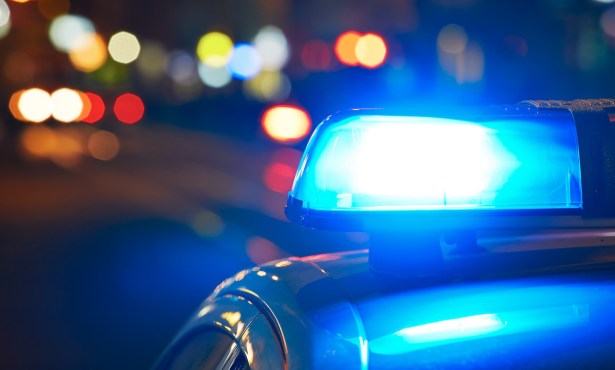Ex-Girlfriend Testifies in Hollywood Trial
Explains Events Before and After Markowitz Murder
Friday afternoon’s proceedings at the Jesse James Hollywood trial revolved around a grueling examination by the prosecution of Michelle Lasher, Hollywood’s girlfriend at the time of the kidnapping and murder of 15-year old Nick Markowitz.
Hollywood faces the death penalty for allegedly ordering the kidnapping and murder of Markowitz over a $1,200 drug debt owed by Markowitz’s half-brother, Ben. According to the prosecution, the 29-year-old Hollywood was a known drug dealer in 2000, and the mastermind behind the kidnapping and murder, though he was not present when convicted murderer Ryan Hoyt used a semi-automatic gun to shoot Markowitz several times in the Santa Barbara foothills.
During a hard series of questions by prosecutor Hans Almgren, Lasher divulged that Hollywood told his friend Casey Sheehan on August 8 that the “situation had been unwound,” in reference to the kidnapping. It was the same evening that several of Hollywood’s friends took Markowitz to an area called Lizards Mouth to kill him. Despite Hollywood’s admission, Lasher said both Hollywood and Sheehan acted “calm” after hearing the news.
Almgren then traced the events following Markowitz’s murder, including Hollywood’s purchase of a brand new silver Lincoln from a Van Nuys dealership and Lasher’s trip to Palm Springs on August 11. Although Lasher had left with two of her friends, Hollywood soon arrived in Palm Springs. “He didn’t tell me of a kidnapping,” Lasher explained. “He was panicked when he came to see me in Palm Springs.” The couple then booked their own hotel room at the Bob Hope Hilton before their eventual road trip out of the state. “Jesse was upset the whole time,” she said, in reference to their Palm Springs trip.
Following an intense round of questioning, the prosecution introduced a registration card from a Colorado hotel, the Loft House, from August 16 and 17. Peculiarly, the card provided a fake name, address, and vehicle-make and color. Lasher explained it was part of her usual registration practices. “I never give my information,” Lasher explained. “That’s something I’ve been taught since I was very little.” However, the address on the hotel registration card, 9758 Lincoln Blvd., was a location Lasher was unable to explain. Prosecutors implied that the fake address was used as a result of Lasher and Hollywood’s collective knowledge of being on the run from authorities. Lasher dismissed the claims when asked of her knowledge of Hollywood being on the run. “I knew something was wrong, but I didn’t know what was going on,” she said.
Prior to Lasher, a woman named Annie Blackford took the stand. Blackford told the court she lived in Woodland Hills in August 2000, and had a sexual relationship with Jesse Hollywood. Her best friend at the time lived a few houses down from Hollywood.
Blackford explained that she met Hollywood, Hoyt, and convicted kidnapper Jesse Rugge one summer when they all began to hang out as a group in May 2000. Blackford also knew Nick Markowitz because she went to high school with him. When asked if she ever saw anything suspicious or illegal going on at the Hollywood residence, she mentioned that she witnessed “frequent selling of drugs and purchasing of numerous guns.” One day she saw Hollywood driving a white van and he seemed distressed, telling her that he was suddenly moving “because too many people knew where he lived.” Blackford said that she was aware that Ben Markowitz owed Hollywood money. After that interaction with Hollywood outside the van, Blackford never saw him again until Friday in court.
Prior to Blackford, Emilio Jerez faced questions about his interactions with Markowitz and the boy’s alleged kidnappers. Jerez was shown a number of bandanas by detectives in order to see if Jerez could identify the one that was used to tie up Markowitz. He did not recognize any of them. Jerez admitted during this series of questions that he “was not completely honest at first with the police because he was scared of the whole situation with Jesse Hollywood.”
While testifying at the Rugge trial, Jerez contradicted himself by saying he never saw Markowitz being tied up while they were at his friend’s house in August 2000. Jerez said Friday he remembers seeing “Hollywood and Rugge in a room with Markowitz, who was sitting on a bed.” Jerez then left the apartment to stay with his friend to avoid the suspicious situation. After a while, Jerez came back home and saw Hollywood and Rugge still at the house. When Hollywood saw Jerez, he whispered into Rugge’s ear. Rugge then approached Jerez and told him not to say anything to anyone about the situation. This frightened Jerez to the point where he felt he could not reveal what he knew to the police.
Defense co-counsel Alex Kessel, in cross examination, questioned Jerez about lying under oath at the Rugge trial. Kessel, as he has done often with witnesses, went over transcripts of prior testimony to discuss differing areas of answers. In an interview with the police, Jerez said that he saw Markowitz bound up, but in the trial he said he didn’t. According to the testimony, Jerez also lied about providing Rugge with tape.
Jerez also said that while he felt threatened by the encounter with Rugge, he thought Markowitz was not in danger. Because he was scared, Jerez went to a barbecue to escape the situation. After coming back later, Jerez saw the crew again and was forced to hang out with them. Rugge told him they were still there because “Nick Markowitz was there and his brother owed him some type of debt.” Jerez had work early the next morning, so he went to bed and let Hollywood and Rugge settle their business downstairs. Jerez never contacted any of these men again, but has been following the case through the media over the past nine years.
Lasher’s testimony will continue Monday at 8:45 a.m. in Dept. 14.



